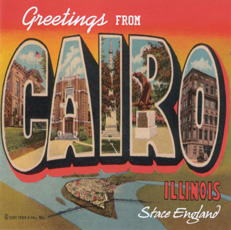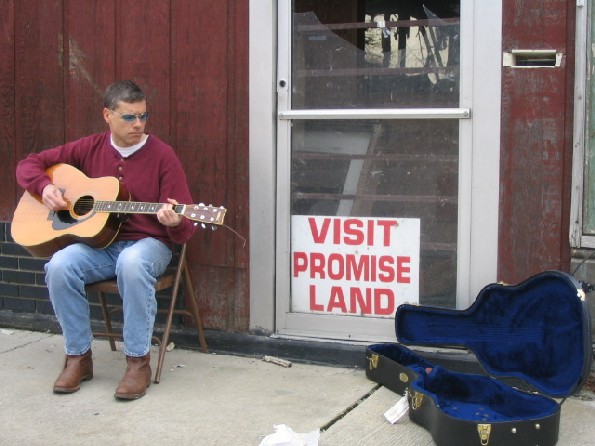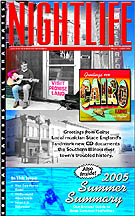 Cairo Association of Teachers - Newsletter
Cairo Association of Teachers - Newsletter
|
|
|
CAT Tracks for June 8, 2005
CAIRO HISTORY MUSIC CD |
Cairo's "storied past" comes to life on a new music CD...


CD Review from FLIPSIDE...

Greetings from Cairo, Illinois: As a city crumbles, local artist sings its history
CARBONDALE - "Greetings from Cairo, Illinois" is not so much an album as an auditory history of the city that haunts singer/songwriter Stace England.
One listen to the CD and the audience will be haunted as well.
Cairo is the cultural metropolis that should have been, and England's seminal work lyricises the political corruption, incompetence and racism begetting the once-great river city's downfall.
The time is ripe to sing this history. Soon enough, Cairo will not be able to tell its own story. Commercial Street's antebellum businesses are rapidly crumbling. Its brick guts are shipped away to places like New Orleans where its rich history means tourism dollars while Cairo struggles in poverty.
"It's a heart-breaking thing to witness," says England, a Cobden resident who has been making pilgrimages to Cairo for the last five years.
"No other city in the United States sprawls the confluence of two great rivers, Northern and Southern culture, and unlimited potential and broken dreams quite like Cairo," England writes in extensive CD notes that give the historical background of each song.
England's years spent researching Cairo's history and meeting its people inspired the album, which features some 50 other musicians with local ties.
In "Equal Opportunity Lynch Mob," Americana favorite the Woodbox Gang helps tell the tale of one of the most infamous lynchings in American history.
The Nov. 11, 1909 hanging, shooting and burning of Will James, a black man accused of raping and killing a white girl, was photographed and sent in a series of postcards publicizing the event throughout the nation and beyond.
That same night, the vigilante mob's bloodlust turned to Henry Salzner, a white man accused of killing his wife. After midnight, the mob dragged Salzner out of prison and hanged him.
The powerful and well-executed chorus of "Lynch Mob" manages to be both hummable and chilling.
"We marched to God's drummin'/when they had it comin'/Justice should be colorblind."
In each of the CD's 11 songs, a new story from Cairo's past unfolds with the help of a band whose mood and style backs it.
The Implications provide the funky "Shaft" inspired beats for "Jesse's Comin' to Town." The song captures the excitement of Jesse Jackson's July 24, 1969 visit to Cairo joining blacks in boycotting downtown merchants.
England composed all of the songs except for two original roots pieces: the 1858 "Goin' down to Cairo" performed with the Little Egypt Barbershop Chorus, and "Cairo Blues," first recorded in 1929 and performed here with Robert Russell.
The resulting mix is required listening for social activists and history buffs as well as for anyone who appreciates Southern Illinois' diverse and wildly talented home-grown musicians.
The music is also resonating beyond our borders, particularly because of the publicity generated by its contributors who forwent pay and carved out precious studio and touring time to satiate England's historic passion.
Alt-country pioneer and SIU grad Jason Ringenberg, who collaborates on a modern track, "Prosperity Train," introduced the album to fans in Europe, where it is being lauded by British, Italian and Dutch roots reviewers.
Hugh DeNeal, witty songwriter for Woodbox Gang, thinks this is just the beginning of a long and hardy howdy for "Greetings from Cairo." DeNeal lauded the "ambitious project" for both its historical significance and its sound.
"I think it will turn some heads from the right people," DeNeal says. "We're definitely proud to be a part of it."
The Woodbox Gang will perform separately and with England at 10 p.m., Friday at the Hangar for the album's release party in a multi-media show that includes projected photographs.
Many of these images come from Preston Ewing's "Let My People Go," a photographic documentation of Cairo's civil rights struggles. England credits the moving book as a major inspiration for the music.
"They say a picture is worth a thousand words; well this was worth a million words," says England, who was stunned to learn of Cairo's significant role in the civil rights struggle.
"It's the most remarkable place. It seems to have a thickness to its history. There's layer after layer of history and racial tension. You peel back a layer, and there are 10 more there."
England hopes "Greetings from Cairo" will inspire us, those left standing in Cairo's ruins, to see solutions instead of looking away.
"Even though it's mightily struggling, there are wonderful people in Cairo who are caught in a cycle they don't seem to know how to get out of," England says. "I closed the record with 'Can't We All Get Along' because there is hope and potential if we start working together."
- Marleen Shepherd
CD Review from NIGHTLIFE...

Stace England's landmark new CD documents the Southern Illinois river towns troubled history.
Stace England and the Cairo Project:
A Snakebit City's History in Music
by Bryan Miller
Southern Illinois is littered with ghost towns. The rivers and railways carried with them progress, depositing clusters of encampments that grew into thriving villages fed on a steady stream of capital. But soon highways and interstates redirected traffic, cutting off the flow of commerce to the suddenly far-flung towns until they atrophied like gangrenous limbs and fell away. For all the towns rendered irrelevant by newly eroded paths of commerce or choked by mine closures, perhaps no town in Southern Illinois has experienced a decline as steep and dizzying and tragic as Cairo.
Stace England's latest album Greetings from Cairo is an elegant and uncompromising look at that sad, storied town, from its roots as a major Midwestern hub during the days of Mark Twain to the ascent (and perhaps simultaneous descent) into a vice economy before exploding with racial tension and subsequently rotting away into a red-state ghetto. The album traces the history of Cairo through music, opening with the jaunty harmonies of barbershop ditties, blues, and country before all the disparate genres collide to make funk and soul and rockabilly.
Greetings from Cairo is both a raucous party of a disc and a musical museum. Stace England, its creator and curator, is a soft-spoken troubadour with a bent for history and a jones for melodies of all stripes and types, a singer/songwriter equally comfortable with blues and country and rock and pop. England was a member of House Afire, a Chicago band who played country/roots music half a decade before every other band in the Second City rediscovered Woody Guthrie. He went on to play with Tecumseh and the Jubilee Songbirds, recording albums of "aggressive folk" and alt/slasher-country respectively before going solo and releasing Peach Blossom Special and the power-pop disc Lovey Dovey All the Time.
For the last five years, England has been at work researching and writing Greetings from Cairo, an album born of his minor obsession with the declining river town.
"The big catalyst to move forward was a book by SIU Press, Let My People Go by Jan Roddy and Preston Ewing," England explains. "[They] took hundreds of photographs of all the stuff going on. I was blown away by that book. One of the things about Cairo is that it's like a parallel universe, a southern town in a northern state. None of it makes any sense-- but it all happened."
England describes the town's history as "snakebit," seemingly cursed. It's that very history, dark and inexplicable, filled with gallows humor (and sometimes just gallows) that inspires him, so much so that one of his greatest tasks in making the CD was editing the tunes and the material to fit onto a single CD.
"I could have written a hundred songs about that place. It's this cross-section of northern and southern culture and history and transportation. It all converges. It's a big stew of everything," England says, noting that Cairo is either a romantic town felled by tragedy or a tragic town full of strange, secret romance. "It's more tragedy right now, but there is that romantic notion, what could have been, what should have been. The reality unfolding on the ground right now is that of tragedy, with all the poverty and urban decay and infighting. The mayor and the city council constantly fight and sue each other. They're in this self-perpetuating cycle. But there are many people who love the town and who want to get some stabilization, save some old buildings. There's no way it's going to make a comeback, but there could be a stabilization if people ever got their act together. It's not going to be what it was in the thirties but it could be an important historic site."
The album opens with the only two songs on the disc not written by England, "Goin' Down to Cairo" and "Cairo Blues." The first track, sung by the Little Egypt Barbershop Chorus, opens the record with a nostalgic twist, echoing the long-gone wellspring of optimism. "Goin' Down to Cairo" sets the tone of the CD by way of antithesis, injecting a hopeful note overhung with dread and melancholy, the harmony heavy with the weight of the chaos to come.
The remaining nine tracks are written by England and performed alongside some of Southern Illinois's most notable musicians. Departing guitar guru Jimmy Salatino lends a hand, as do Makanda favorites the Woodbox Gang and Carbondale's expatriate legend Jason Ringenberg.
England says he wrote most of the songs with the collaborators in mind, noting, "I had a sense of kind of the players I wanted on specific tracks, like the Rum Runners' horns on 'Jesse's Comin' to Town.' Everybody was willing to do it. These people are great musicians, but they're also great human beings."
Personal greatness aside, England's consciousness of the collaboration during the writing stage allows the talented group of Carbondale pickers and singers to shine. While the album is a jumble of styles and genres centered around a concept, each track has clarity and autonomy, a focus. On "Equal Opportunity Lynch Mob," a song about a black man and a white man strung up by a bloodthirsty rabble on the same night, England isn't just backed by the Woodbox Gang. Instead the song sounds like a Woodbox Gang song with its black comedy and subtly unsettling source material:
We're an equal opportunity lunch mob
Vengeance with an open mind
We marched to God's drumming
When they had it coming
Justice should be colorblind
Perhaps England's most esteemed cohort is Jason Ringenberg, the SIU alum and coinventor of cowpunk who hit Rolling Stone's one-hundred greatest albums of all time along with his bandmates the Scorchers. England says he wrote "Prosperity Train" hoping to find somebody "who could really nail it, somebody like the Scorchers," then decided to take the track to the man himself.
"I had a little bit of contact with [Ringenberg] a number of years ago," England explains. Just as Ringenberg was putting the finishing touches on his latest record Empire Builders, England sent him the song. "He said 'I like it, I'm way into it, and if we do it right now I've got people in the room already.' The timing was cosmic to make it happen, and we were able to bang it out pretty quickly. He liked the idea of a Cairo CD and he liked the track. I think he nailed it to the wall."
England cites Ringenberg's contribution-- perhaps the most balls-out, honkytonk rock song on the record, along with the excellent "White Hats"-- as his favorite. He says that it's particularly hard with this album to pick favorite songs, however, "mainly because of the performances that the bands brought to them. I love 'Equal Opportunity Lynch Mob' because of what the Woodbox Gang did on it. I'm so delighted. To me it feels more like collective project than a solo record."
The multitude of contributors (fifty-six, if you're counting) and England's write-for-the-collaborator approach keeps Greetings from Cairo from suffering from the standard maladies of the concept album. In other words, England's latest is no Tommy or Kilroy Was Here. Each song-- with the likely exception of "Goin' Down to Cairo" which mostly works as an intro track-- works well standing alone. England has written a group of songs that are fully independent, occasionally disparate, which are more associated than linked. Greetings from Cairo, then, is more akin to a mosaic than a narrative. The album is a kind of "Magic Eye" CD that is intriguing when scrutinized piece by piece but which unfolds as a much more compelling and complex picture when viewed as a whole.
"I like the challenge of a concept album," says England. "If you're going to string things together, that's an even higher bar to shoot for. It's just an issue of trying to maintain focus, selecting the best nuggets from the landscape of what your concept is. That's the challenge is editing things... then latching onto them and stringing them together in a way that makes sense to people. Can this be done? Can we pull it off? It could be ridiculous or sublime."
Sublime seems to be the overall opinion. Even across the Atlantic, Greetings from Cairo is a hit.
"We're getting some nibbles in Europe," says England. "We didn't know if the story would resonate with people outside of the region, and we're finding that it does, which is great. We've gotten some Italian and British reviews, which are quite good."
Being well-received by music critics is one thing, but having the work welcomed by those who live and work and die in Cairo might be entirely different. England says he has not yet talked to the townsfolk, many of whom he worked with during his research, to discover their perspective on the record. England is optimistic about the reception his latest work will receive from those who will find the songs the most immediate and personal, although he remains realistic about the likely opinions regarding some of the album's gritty, unflinching, and at times downright unpleasant content. The song "White Hats," for instance, tells the story of a radical kind of neighborhood-watch group that took a turn for the surreal. Soon the group of not-quite-vigilantes became hundreds strong and began wearing white construction hats to show their membership in a group whose crimes were not limited to fashion faux pas but racism, paranoia, and bullying. (England writes in the upbeat but foreboding song, "White hats, minds full of hate/Equality is gonna have to wait.")
"A lot of people won't like some of the content like "White Hats," because a lot of those people are still living. When I first started doing research I showed up and said I wanted to make a record and everybody kind of clammed up. There's kind of a persecution complex toward outsiders: 'Why are you doing this?'"
England insists that he has a lot of love for the town. He says he's not trying to criticize or point fingers, but the ugly side of Cairo's history is just as real (and perhaps more immediate) than its pleasant side.
"The analogy I use is, when you talk about U.S. history, you can't not talk about slavery or Japanese internment in World War II," he says. "You have to be upfront about it. You can't talk about Cairo without addressing the race question. You try to see both sides of the coin. On 'White Hats,' for instance.... I've always viewed those guys as very cartoonish, guys running around armed with white construction hats. It helped me understand the mindset of how that happened, because in these people's minds, society was coming apart. These riots are breaking out and people don't know what to do, but then [their intentions] unfold into something more sinister. That group may have started with the best of intentions, but... well, I've tried to approach and learn by talking with both sides in that. There are a lot of good people in that town who got caught up in wild stuff, people on both sides, but that doesn't mean they're bad people."
The negative, England says, is not his focus. He's content to live in Carbondale, sing about Cairo, and keep getting by with a little help from his friends.
"It's a pleasure to make music here, and I am in great debt to everyone who worked on the record," he says. "Now we're trying to bring Cairo to the world."
CD Review from PULSE...

"Greetings from Cairo"
Jared DuBach
Pulse reporter
Area singer and songwriter Stace England has maintained a firm creative focus on southern Illinois for most of his adult life. His focus has been kept on the area because of a certain vibe the musician says the area emanates.
That vibe reaches all the way down to Cairo, a small town at the southernmost tip of Illinois, which has served as the inspiration for England's latest CD, "Greetings from Cairo."
England said the town and its citizens have suffered much in the way of adversity from financial despair and racial prejudice. Cairo has had an eventful history England has labored to chronicle on the 11-song CD, which will be officially released April 19 by Gnashville Sounds. Although England is going to perform a CD release show May 13, he will also be performing at 10 p.m. March 19 at Hangar 9.
Any project of this undertaking needs a starting point. While the concept of the CD came about almost three years ago, and it took almost a year from finished songs to completed recordings, England has had a long running connection with Cairo.
"I think it got its hooks in me almost 30 years ago when my mom and me and my grandmother drove through town when I was a youngster," England said. "And I knew something was up."
England said the more immediate inspiration behind "Greetings from Cairo" came from his reading of "Let My People Go" by Preston Ewing, who was the head of the NAACP.
"He just took his camera around town during that time when the Nazis were in town and all that bizarre stuff and chronicled it with photographs," England said.
After being awestruck by the book, England spent a great amount of time in Cairo interacting with some of the town's residents and furthering his research into some of the events that may have led to the town's arrested development.
"The first thing you're struck by is: 'Why isn't there a giant city here?' You've got two major water routes, rail lines; you've got interstate highway," England said.
"That's when you start to peel it back and get into the layers of it. It's just fascinating. It's kind of like Elvis. Here's this thing that should've been great but ended up becoming this remarkable tragedy."
Some of the layers England refers to ended up as the songs on "Greetings from Cairo." There are more traditional arrangements, like the folk tune "Goin' Down to Cairo" and "Cairo Blues," while songs like "Grant Slept Here" and "Equal Opportunity Lynch Mob" serve up some crucial historical background on the town.
According to content found in "Greetings from Cairo," "Grant Slept Here" is about Ulysses S. Grant's five-month stationing in Cairo during the Civil War while he led campaigns in Kentucky and Missouri, before he was made a general and moved to Tennessee. After his second presidential term, Grant was honored at a reception in 1880 in Cairo at Magnolia Manor.
"Equal Opportunity Lynch Mob" recounts the grizzly lynchings of Will James and Henry Salzner on the night of Nov. 11, 1909. A crazed mob drug Salzner from his jail cell and hung him after he'd been accused of killing his wife. Will James was a black man who had been accused of raping and killing a white girl named Ann Pelly in a Cairo alley.
When James was hanged, the rope broke, so he was shot and burned to death instead. His charred head was severed from his body and placed on a pole for all to see. Subsequently postcards were widely circulated of the dual lynching, serving as a record of one of the most infamous lynching in U.S. history.
"White Hats" and "Jesse's Comin' to Town" serve as more modern historical accounts.
"White Hats" is about the forming of the Committee of 10 Million, otherwise referred to as the White Hats. The White Hats were formed after an Army private returned home, was arrested and died while in prison from an alleged suicide the black community didn't buy.
The incident resulted in three days of rioting, which brought in the National Guard for police action. The White Hats acted afterward as a method of community enforcement and shared the motto "States Rights - Racial Integrity" with White Citizens Councils and United Citizens for Community Action.
Shortly after the assassination of Dr. Martin Luther King Jr., black citizens began to boycott local businesses and services that refused to hire or serve black members of the community. This prompted Jesse Jackson and other leaders to visit Cairo in support of the boycotts.
England said about 56 musicians performed the songs on the album. Featured musicians include the Woodbox Gang, Jason Ringenberg (Jason and the Scorchers fame), The Implications, Little Egypt Barbershop Chorus, Robert Russell, Jimmy Salatino, Charlie Morrill, the Gutterswans, George Bradfute and Steve Ebe. England took careful note of each musician and musical group's style of playing and fitted them accordingly for the desired sound of each song.
But Cairo is not a town without hope. England said if city officials simply started to work together for the benefit of everyone, things may start to turn for the better. A few poor judgments early on set the tone for a promising community that only went on to create a snowball effect.
"Things happened there with reasonable people that sort of went over the edge with things," England said.
"The human condition is on display there - the best of it and the worst of it in that little town there and in these stories."
You can visit the website for more information.